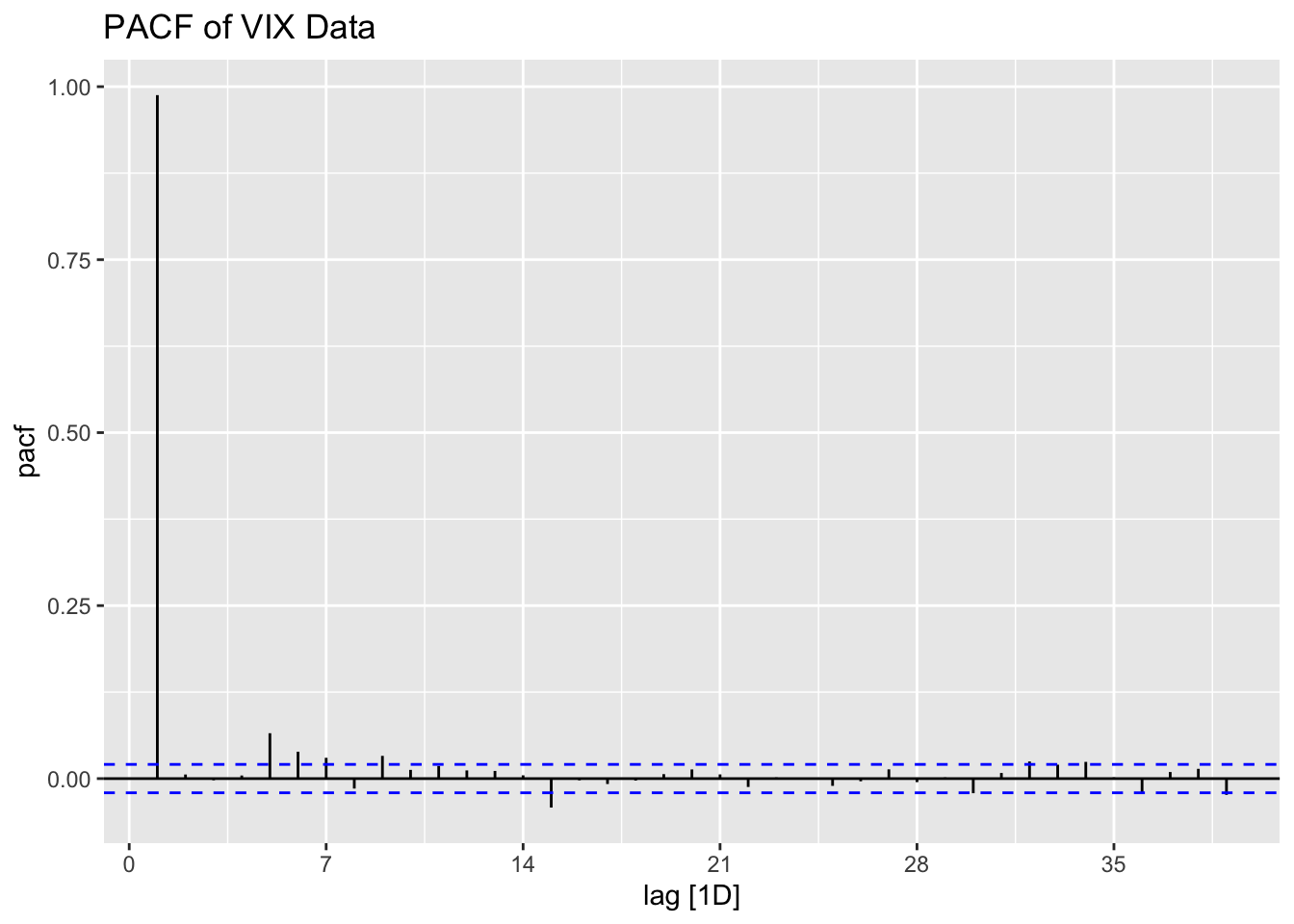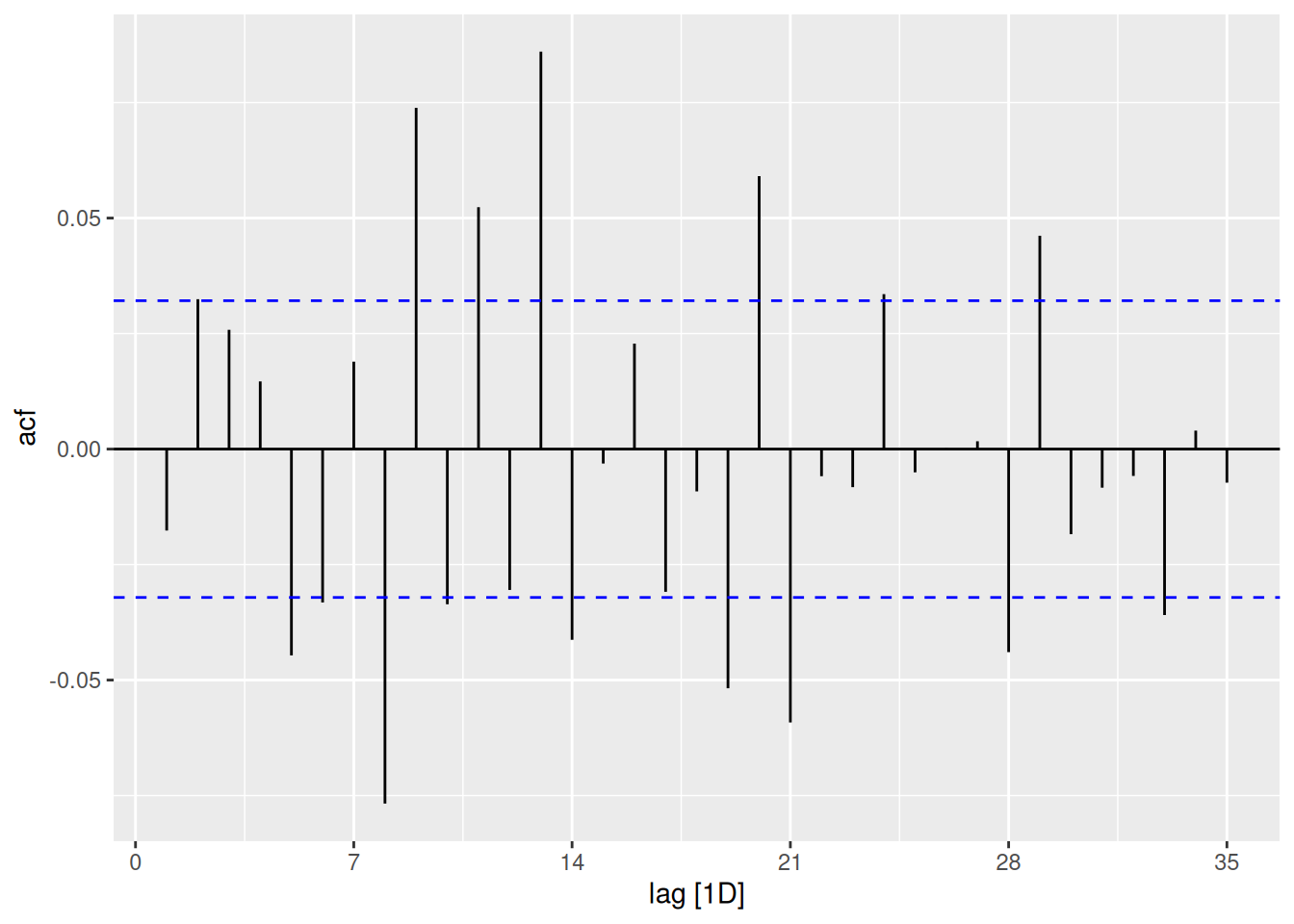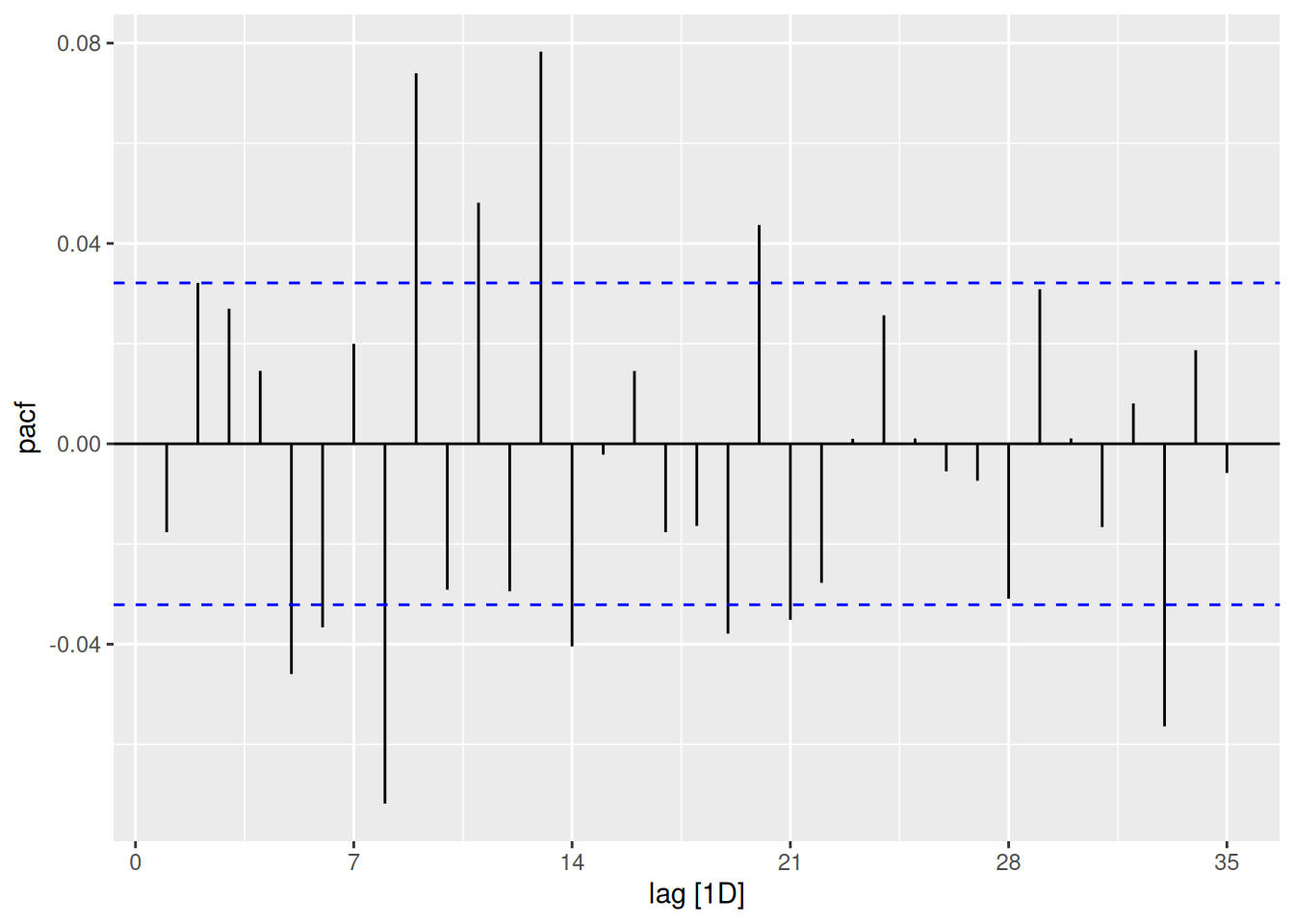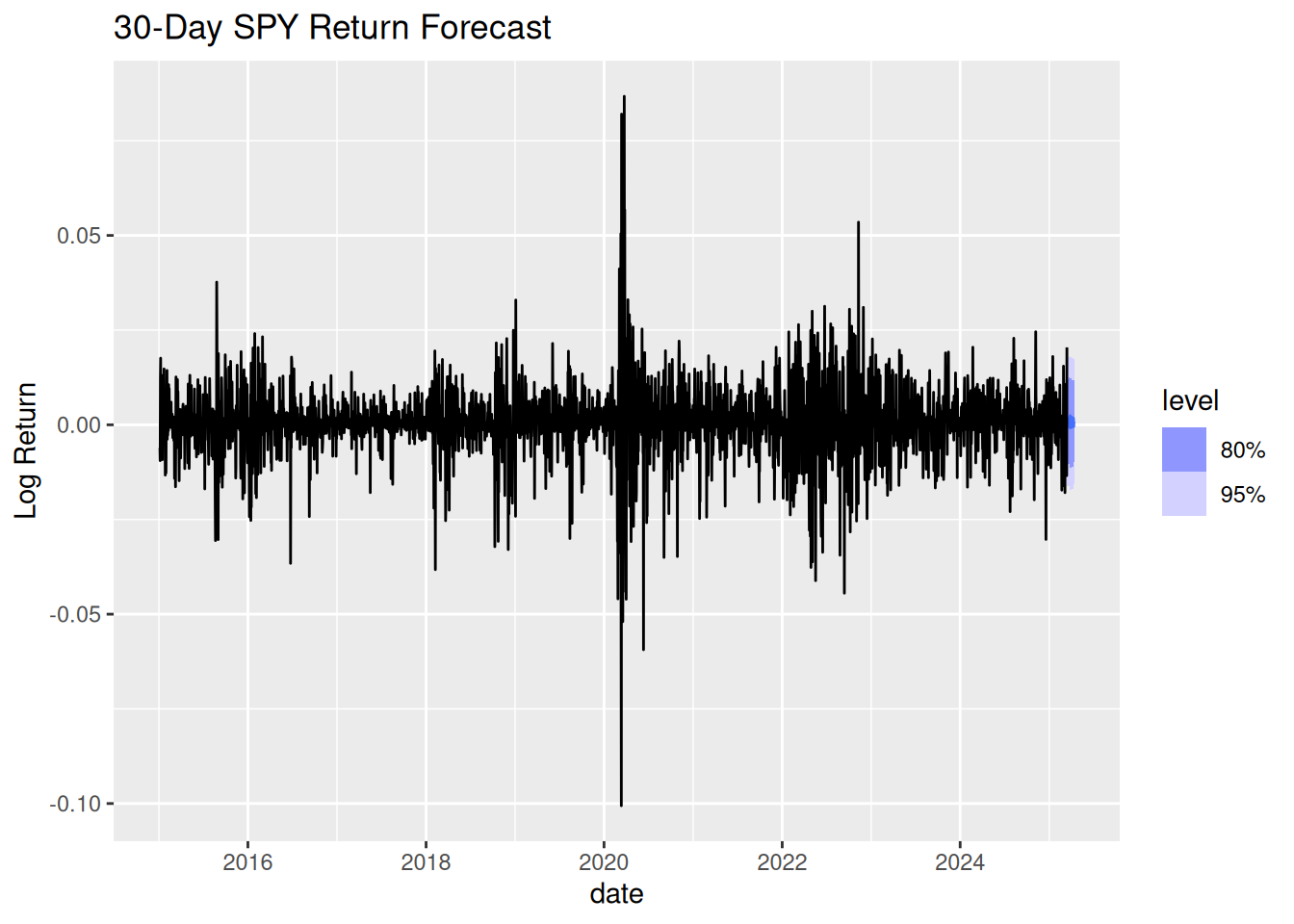# Retrieve VIX data from 2000-01-01 to current date and convert to a tsibble
vix_data <- tq_get("^VIX", from = "2000-01-01",
to = "2025-01-01",
get = "stock.prices") %>%
as_tsibble(index = date)
# Clean and interpolate missing values
vix_data <- vix_data %>%
tsibble::fill_gaps() %>%
mutate(adjusted = zoo::na.approx(adjusted)) %>%
select(date, adjusted) %>%
tidyr::drop_na()Activity12
Model Selection & Diagnostic Criteria
Today, we will walk through a complete model selection exercise using VIX data. Our goals are to:
- Perform Exploratory Data Analysis (EDA) with visual diagnostics.
- Fit built-in models (ARIMA and ETS) using the
Tidyvertsframework. - Evaluate models based on five metrics: AIC, AICc, BIC, Mean Squared Error (MSE), and Root Mean Squared Error (RMSE).
- Conclude on the optimal model by comparing these metrics along with residual diagnostics and forecast performance.
For a model with \(n\) observations and \(k\) parameters (including the intercept), the evaluation criteria are defined as:
\[ \begin{align} \text{AIC} &= n\ln\left(\frac{\text{RSS}}{n}\right) + 2k,\\[1mm] \text{BIC} &= n\ln\left(\frac{\text{RSS}}{n}\right) + k\ln(n),\\[1mm] \text{AICc} &= \text{AIC} + \frac{2k(k+1)}{n-k-1}, \end{align} \]
and the error metrics:
\[ \begin{align} \text{MSE} &= \frac{\text{RSS}}{n},\\[1mm] \text{RMSE} &= \sqrt{\text{MSE}}. \end{align} \]
Data Preparation
We retrieve the VIX data and format as a tsibble, handling missing values while preserving the original adjusted price series.
Exploratory Data Analysis (EDA)
Time Series Plot
vix_data %>%
autoplot(adjusted) +
labs(title = "VIX Adjusted Prices", y = "Adjusted", x = "Date")
ACF and PACF Analysis
vix_data %>%
ACF(adjusted) %>%
autoplot() +
labs(title = "ACF of VIX Data")
vix_data %>%
PACF(adjusted) %>%
autoplot() +
labs(title = "PACF of VIX Data")
Observation:
The persistence in ACF suggests potential need for differencing, but we’ll let ARIMA automatically handle any required transformations through its \(d\) parameter.
Model Fitting Using Tidyverts
1. ARIMA Model (Original Series)
# Fit an ARIMA model on original series
model_arima <- vix_data %>%
model(ARIMA(adjusted))
# Display summary report
report(model_arima)Series: adjusted
Model: ARIMA(3,1,1)(0,0,2)[7]
Coefficients:
ar1 ar2 ar3 ma1 sma1 sma2
0.9615 0.0082 -0.0179 -0.9811 0.0286 0.0553
s.e. 0.0168 0.0145 0.0122 0.0133 0.0115 0.0107
sigma^2 estimated as 1.728: log likelihood=-15446.52
AIC=30907.05 AICc=30907.06 BIC=30956.88# Display accuracy metrics
model_arima %>% accuracy()# A tibble: 1 × 10
.model .type ME RMSE MAE MPE MAPE MASE RMSSE ACF1
<chr> <chr> <dbl> <dbl> <dbl> <dbl> <dbl> <dbl> <dbl> <dbl>
1 ARIMA(adjusted) Traini… -0.00181 1.31 0.731 -0.220 3.42 0.356 0.403 -2.97e-42. ETS Model
# Fit ETS model on original series
model_ets <- vix_data %>%
model(ETS(adjusted))
# Display summary report
report(model_ets)Series: adjusted
Model: ETS(M,Ad,M)
Smoothing parameters:
alpha = 0.9998863
beta = 0.0449181
gamma = 0.0001019892
phi = 0.8178318
Initial states:
l[0] b[0] s[0] s[-1] s[-2] s[-3] s[-4] s[-5]
25.49738 -0.7829361 1.00114 0.9990668 0.9956332 1.002539 0.9994978 0.9996608
s[-6]
1.002462
sigma^2: 0.003
AIC AICc BIC
83569.41 83569.45 83661.96 # Display accuracy metrics
model_ets %>% accuracy()# A tibble: 1 × 10
.model .type ME RMSE MAE MPE MAPE MASE RMSSE ACF1
<chr> <chr> <dbl> <dbl> <dbl> <dbl> <dbl> <dbl> <dbl> <dbl>
1 ETS(adjusted) Training -0.000342 1.32 0.732 -0.120 3.43 0.356 0.405 -0.0392Forecasting with the Optimal Model
# Forecast 12 months ahead using ARIMA
forecast_arima <- model_arima %>%
forecast(h = "12 months")
# Plot forecast in original units
forecast_arima %>%
autoplot(vix_data) +
labs(title = "12-Month VIX Forecast", y = "Adjusted VIX", x = "Date")
Lab Activity: Modeling Stock Returns with ARIMA
Model daily SPY returns using ARIMA, analyze residuals, and compare with ETS.
Tasks
- Retrieve SPY data (2015-01-01 to present) and compute daily log returns
- Perform EDA (time series plot, ACF/PACF)
- Fit ARIMA(2,0,1) and ETS models to returns
- Compare models using AIC and RMSE
- Forecast 1-month ahead returns
Solution
# Task 1: Data Preparation
spy_data <- tq_get("SPY", from = "2015-01-01") %>%
as_tsibble(index = date) %>%
tsibble::fill_gaps() %>%
mutate(adjusted = na.approx(adjusted),
log_return = difference(log(adjusted))) %>%
select(date, adjusted, log_return) %>%
tidyr::drop_na()
# Task 2: EDA
spy_data %>% autoplot(log_return) +
labs(title = "SPY Daily Log Returns", y = "Return")
spy_data %>% ACF(log_return) %>% autoplot()
spy_data %>% PACF(log_return) %>% autoplot()
# Task 3: Model Fitting
fit_arima <- spy_data %>%
model(ARIMA(log_return ~ pdq(2,0,1)))
fit_ets <- spy_data %>%
model(ETS(log_return))
# Task 4: Model Comparison
glance(fit_arima) %>% select(AIC, AICc, BIC)# A tibble: 1 × 3
AIC AICc BIC
<dbl> <dbl> <dbl>
1 -24976. -24976. -24926.glance(fit_ets) %>% select(AIC, AICc, BIC)# A tibble: 1 × 3
AIC AICc BIC
<dbl> <dbl> <dbl>
1 -4714. -4714. -4695.accuracy(fit_arima)# A tibble: 1 × 10
.model .type ME RMSE MAE MPE MAPE MASE RMSSE ACF1
<chr> <chr> <dbl> <dbl> <dbl> <dbl> <dbl> <dbl> <dbl> <dbl>
1 ARIMA(log_ret… Trai… -6.56e-7 0.00866 0.00511 NaN Inf 0.697 0.722 -4.23e-4accuracy(fit_ets)# A tibble: 1 × 10
.model .type ME RMSE MAE MPE MAPE MASE RMSSE ACF1
<chr> <chr> <dbl> <dbl> <dbl> <dbl> <dbl> <dbl> <dbl> <dbl>
1 ETS(log_return) Train… 1.60e-6 0.00870 0.00509 -Inf Inf 0.695 0.726 -0.0305# Task 5: Forecasting
fit_arima %>%
forecast(h = 30) %>%
autoplot(spy_data) +
labs(title = "30-Day SPY Return Forecast", y = "Log Return")